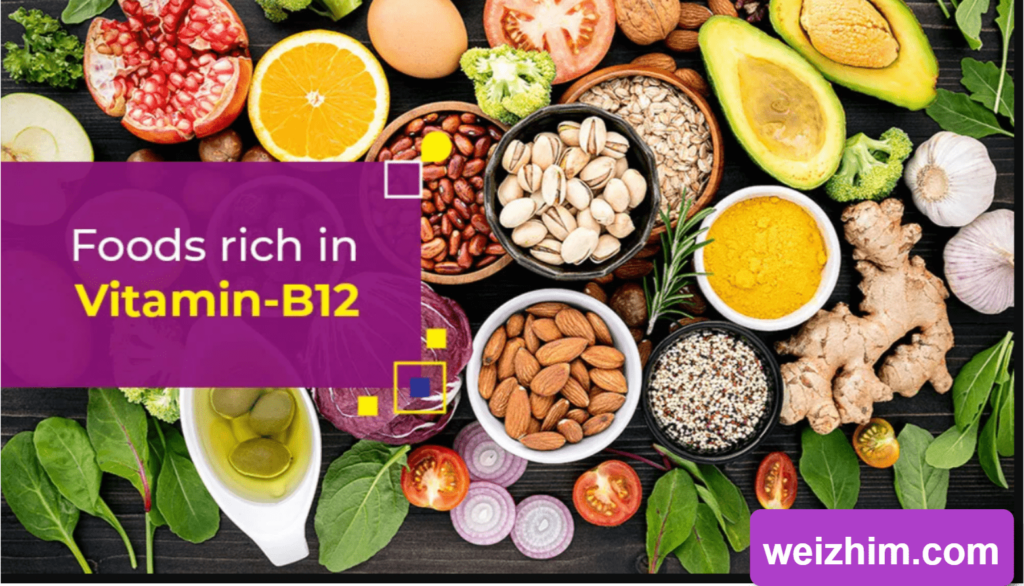Top 14 Best Vitamin B12 Foods for Vegetarians in India
The human body requires 13 essential vitamins, with B-vitamins, including B12 (Cobalamin), playing crucial roles in energy metabolism, nerve function, and red blood cell formation. Discovered in 1948, vitamin B12 is notable for its cobalt content and is primarily found in animal-based foods. For vegetarians and vegans, obtaining adequate B12 can be challenging due to the absence of these sources in their diets. This article explores effective ways for vegetarian Indians to meet their B12 needs through various foods and supplements.
Vitamin B12 Foods Vegetarian Indian
- Milk and Cheese
Cow’s milk is widely consumed in India and provides approximately half of the daily B12 requirement in a 250 ml serving. Additionally, Swiss cheese stands out as a rich source of B12, offering 1.5 mcg per 50 gms. - Yoghurt
Low-fat plain yoghurt is another excellent source, providing about 16% of the daily B12 requirement in a 170 g serving. It can be easily incorporated into daily meals or combined with fortified cereals for added nutrition. - Paneer (Cottage Cheese)
Paneer is a popular dairy product in Indian cuisine and contains approximately 0.8 grams of B12 per 100 gms. It serves as a substantial source of vitamin B12, contributing significantly to daily dietary needs. - Fortified Food
Fortified cereals are increasingly available in the Indian market and are designed to provide essential nutrients, including B12, which are not naturally present in the food. It’s important to choose fortified products that are free from harmful additives and rich in whole grains and fiber. - Whey Powder
Whey powder, often used as a protein supplement, contains approximately 8% of the daily B12 requirement per 32 gms. It can be mixed with milk or yoghurt to boost B12 intake effectively. - Shiitake Mushroom
While not as high in B12 as animal products, shiitake mushrooms are a notable source for vegetarians. Incorporating them into various dishes can contribute to overall B12 intake, although larger quantities may be needed to meet daily requirements. - Tempeh
A fermented soybean product, tempeh is rich in B12 and commonly used in vegetarian diets, especially in dishes like curries and soups. - Nori
Nori, a type of edible seaweed popular in Japanese cuisine, is rich in B12 and available in the form of sheets or powder. It can be used to make sauces, added to soups, or sprinkled over salads and sandwiches to increase B12 intake. - Eggs
While not suitable for vegans, eggs are a significant source of B12 for lacto-ovo vegetarians. A single hard-boiled egg provides about 0.6 mcg of B12, fulfilling 25% of the daily requirement.
Fruits Rich in Vitamin B12
- Apple
Apples are rich in antioxidants and fiber but do not contain significant amounts of B12. - Banana
Bananas are nutritious fruits known for their potassium content and digestive benefits but do not contribute to B12 intake. - Orange
Oranges are packed with Vitamin C and other essential nutrients but do not contain B12. - Blueberries
Blueberries are antioxidant-rich and beneficial for various health conditions but do not provide B12. - Almonds and Peanuts
Dry fruits like almonds and peanuts are nutritious snacks but do not contain B12 in significant amounts.
Foods or Drinks to Avoid if You Want to Increase Vitamin B12
It’s important to be aware of foods and drinks that can hinder B12 absorption or utilization in the body:
- Folic Acid – Fortified Food: While folate (vitamin B9) is essential, excessive intake from fortified foods can mask B12 deficiency symptoms and interfere with B12 absorption. Adults should limit daily intake to 1000 mcg to avoid potential health issues.
- Alcohol: Moderate to excessive alcohol consumption can lower B12 levels in the body, affecting overall health and wellbeing.
Symptoms of B12 Deficiency
Recognizing the signs of B12 deficiency is crucial for timely intervention and prevention of health complications:
- Yellow, Pale Skin: Anemia resulting from B12 deficiency can cause pale or yellowish skin due to reduced red blood cell production.
- Weakness and Fatigue: Inadequate B12 levels impair oxygen transport in the blood, leading to fatigue and weakness.
- Pins and Needles Sensation: Nerve damage from B12 deficiency may cause tingling or numbness in the hands and feet.
- Balance and Coordination Problems: Neurological symptoms like imbalance or difficulty walking can result from B12 deficiency affecting nerve function.
- Mouth Ulcers and Inflamed Tongue: Glossitis, or inflammation of the tongue, along with mouth ulcers, are common symptoms of B12 deficiency.
- Shortness of Breath and Dizziness: Reduced oxygen-carrying capacity of the blood due to B12 deficiency can lead to breathlessness and dizziness.
- Vision Problems: Optic nerve damage from B12 deficiency may cause blurred vision or other visual disturbances.
- Moodiness and Behavioral Changes: B12 deficiency can affect mental health, leading to mood swings, depression, or anxiety.
- Cognitive Decline: Prolonged B12 deficiency may impair memory, concentration, and overall cognitive function.
Summing Up on Vitamin B12 Foods for Vegetarians in Indians
For vegetarians and vegans in India, maintaining adequate B12 intake is crucial for overall health. While animal products are the primary sources of B12, incorporating dairy products like milk, cheese, yoghurt, and paneer into the diet can help meet daily requirements. Fortified foods, mushrooms, and supplements are alternative sources for vegetarians. Understanding B12 deficiency symptoms and avoiding inhibitors like excessive alcohol and folate-rich fortified foods is essential for optimal B12 absorption and utilization.
Frequently Asked Questions (FAQs)
- Does Ghee Have Vitamin B12?
No, ghee does not contain vitamin B12. - Do Almonds Have Vitamin B12?
Almonds are nutritious but do not contain significant amounts of B12. They should be supplemented with other B12-rich foods to meet daily requirements. - Does Paneer Have B12?
Yes, paneer contains about 0.8 grams of B12 per 100 gms, making it a valuable source for vegetarians.






